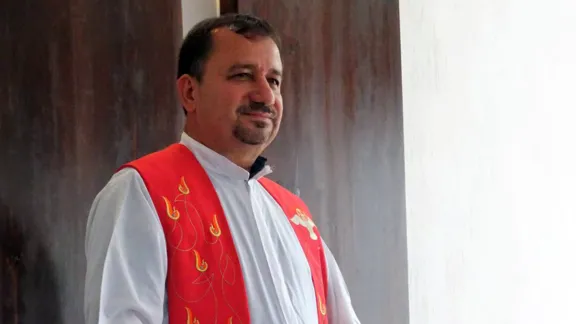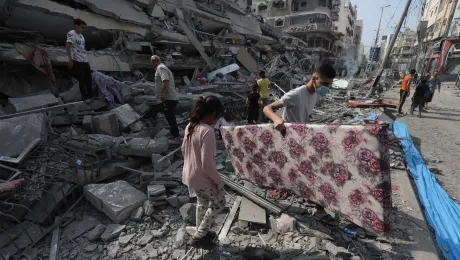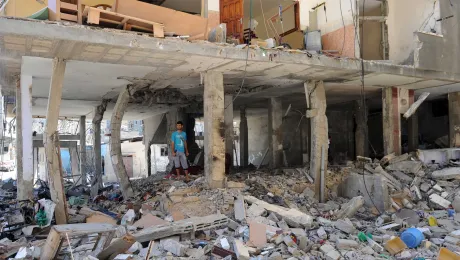
Rev. José Pilar Ãlvarez Cabrera, President of the Guatemala Lutheran Church. Photo: Craig Foster
Interview with ILUGUA President Rev. José Pilar Álvarez Cabrera
(LWI) – In January 2019, the Guatemalan government rescinded an agreement with the International Commission Against Impunity in Guatemala (Comisión Internacional contra la Impunidad en Guatemala or CICIG), effectively disbanding the work of the commission which was set up in 2006 with support from the United Nations (UN). The Guatemala Lutheran Church (ILUGUA) is among several civil society organizations that have openly protested the government’s decision, saying it is a step back in the country’s fight against corruption and impunity.
In this interview for Lutheran World Information, ILUGUA President Rev. José Pilar Álvarez Cabrera explains why the CICIG agreement should be restored. The Lutheran World Federation (LWF) member church is a strong advocate for the human rights of marginalized communities in the country.
What do you think were the main factors that contributed to termination of the CICIG’s mandate?
Its huge success. For example, the conviction on corruption charges of a former president and vice-president; this would have been unfathomable in Guatemala without the CICIG. The International Commission is a threat to the de facto power in Guatemala, which through repression, despotism, corruption and impunity has managed to impose in the country its own interests against the interests and wellbeing of the majority of the population.
What are other CICIG achievements?
The most important and profound achievement of the International Commission is the quest for a truly independent justice system, and the full realization of the rule of law.
How does the decision to terminate the commission’s mandate affect the justice system and the fight against corruption?
The CICIG is a very important support tool for the vast majority of honest civil servants within the justice system including the public prosecutor's office, the national civilian police and the courts, who are fighting daily against pressures and repression suffered through corruption.
These institutions have been historically co-opted and controlled through corruption, and lack the necessary functional independence to safeguard the rule of law. The International Commission has yielded good results in the fight against such control and must therefore be suppressed in order for the de facto power to be maintained.
Does terminating the CICIG agreement put justice officials at risk?
The CICIG had become a guarantor, a safeguard for honest prosecutors, policemen and magistrates, it was a basic tool and reference that spared them the pressures and repression. The CICIG also contributed to guaranteeing the necessary independence of the judicial system, the basis of the rule of law. In addition, magistrates face higher risks.
The more voices denounce and oppose corruption and impunity in Guatemala, the stronger the fight against these vices. Our goal is to help strengthen the rule of law and thus strengthen the judicial system.
What alternatives or other mechanisms do judges have to continue working without the CICIG?
Very few. The truth and reality are that repression, despotism, corruption and impunity have prevailed in the country. All honest Guatemalans and those who support them must continue fighting for CICIG’s work to continue.
There is a government’s initiative to reform the National Reconciliation Act. What impact could this have on victims of human rights’ violations in Guatemala?
The reform of the National Reconciliation Act promotes an amnesty for crimes such as genocide, enforced disappearances and torture, which in turn favors state criminal structures that are part of the de facto powers. The reform is an obvious setback for the rights of victims who are still seeking the truth about what happened to their family members, as well as the right to compensation and access to justice for the grave violations of human rights during the armed conflict in Guatemala [1960-1996]. It is for this reason that both victims and those of us concerned for their rights oppose this reform.
What has been the role of churches in the public sphere in this context?
Many prophetic voices have risen against corruption and impunity in Guatemala. All historical and ecumenical churches in Guatemala have shown in many ways that they reject and have exposed the corruption and impunity of criminal structures of Guatemala. We must add to this group civil society organizations demanding that the CICIG continue its work.
Why is it important for churches to adopt a position in these matters?
By following Jesus, the mission of the church is to proclaim justice as the basis for peace and at the same time denounce structures of injustices, corruption and impunity. Our church is based upon actions carried out in the framework of local and national partnerships in the fields of human rights, gender justice, environmental justice, citizens’ participation and indigenous peoples’ rights, amongst many others.
The more voices denounce and oppose corruption and impunity in Guatemala, the stronger the fight against these vices. Our goal is to help strengthen the rule of law and thus strengthen the judicial system.
The Guatemala Lutheran Church President Rev. José Pilar Álvarez Cabrera is known for his outspoken advocacy for human rights defenders in Guatemala, a stand that has exposed him to persecution, death threats and other risks but also earned him global recognition. The LWF, which the church joined in 2014, intervenes at the UN for the country’s human rights defenders. While the government of Guatemala prohibits the CICIG from operating in the country, the UN has indicated that the commission can continue its mandate from abroad.


